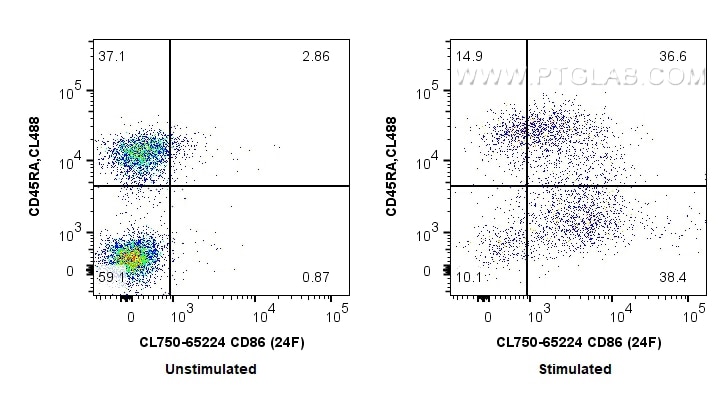Anticorps Monoclonal anti-CD86
CD86 Monoclonal Antibody for FC
Hôte / Isotype
Mouse / IgG1, kappa
Réactivité testée
rat
Applications
FC
Conjugaison
CoraLite® Plus 750 Fluorescent Dye
CloneNo.
24F
N° de cat : CL750-65224
Synonymes
Galerie de données de validation
Applications testées
| Résultats positifs en cytométrie | LPS-stimulated rat splenocytes |
Dilution recommandée
| Application | Dilution |
|---|---|
| This reagent has been tested for flow cytometric analysis. It is recommended that this reagent should be titrated in each testing system to obtain optimal results. | |
| Sample-dependent, check data in validation data gallery | |
Informations sur le produit
CL750-65224 cible CD86 dans les applications de FC et montre une réactivité avec des échantillons rat
| Réactivité | rat |
| Hôte / Isotype | Mouse / IgG1, kappa |
| Clonalité | Monoclonal |
| Type | Anticorps |
| Immunogène | HTLV-1-transformed Lewis-S1 rat T cell line |
| Nom complet | CD86 molecule |
| Masse moléculaire calculée | 36 kDa |
| Numéro d’acquisition GenBank | NM_020081 |
| Symbole du gène | Cd86 |
| Identification du gène (NCBI) | 56822 |
| Conjugaison | CoraLite® Plus 750 Fluorescent Dye |
| Excitation/Emission maxima wavelengths | 755 nm / 780 nm |
| Forme | Liquide |
| Méthode de purification | Purification par affinité |
| Tampon de stockage | PBS with 0.09% sodium azide. |
| Conditions de stockage | Store at 2-8°C. Avoid exposure to light. Stable for one year after shipment. |
Informations générales
CD86 (also known as B7.2) is a costimulatory molecule belonging to the immunoglobulin superfamily. Primarily expressed on antigen-presenting cells (APCs), including B cells, dendritic cells, and macrophages, CD86 is the ligand for two proteins at the cell surface of T cells, CD28 antigen and cytotoxic T-lymphocyte-associated protein 4. Binding of CD86 with CD28 antigen is a costimulatory signal for activation of the T-cell. Binding of CD86 with cytotoxic T-lymphocyte-associated protein 4 negatively regulates T-cell activation and diminishes the immune response.
Protocole
| Product Specific Protocols | |
|---|---|
| FC protocol for CL Plus 750 CD86 antibody CL750-65224 | Download protocol |
| Standard Protocols | |
|---|---|
| Click here to view our Standard Protocols |


